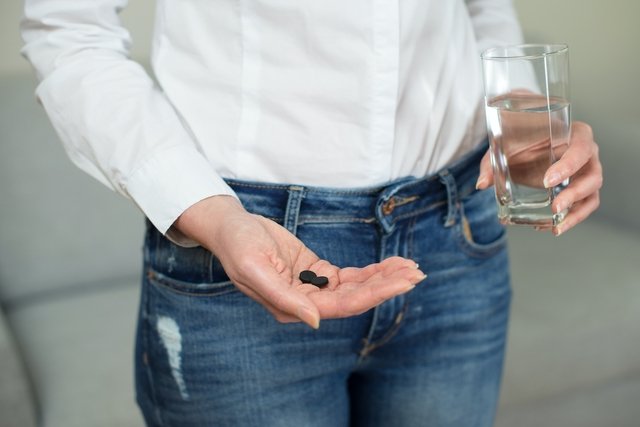Activated charcoal is a processed form of common charcoal capable of absorbing toxins and chemical substances in the gastrointestinal tract, and is mainly indicated for the treatment of poisoning.
Furthermore, due to its great capacity for adsorbing toxins and chemicals in the body, activated charcoal can also contribute to reducing intestinal gas and abdominal pain.
However, this medication may affect the absorption of certain vitamins, minerals and other medications and should be used in moderation, as advised by your doctor.
What is it for
Activated charcoal is indicated for:
1. Eliminate intestinal gas
Activated charcoal has the ability to adsorb intestinal gases, reducing bloating, pain and intestinal discomfort. Check out some tips to eliminate gas quickly.
2. Treat poisoning
As activated charcoal has great adsorption power, it can be used in emergency situations in cases of poisoning by chemical products or medications, such as carbamazepine, phenobarbital, quinine, theophylline and dapsone, for example.
Furthermore, this remedy can also be indicated in cases of food poisoning, as it is capable of binding to bacterial toxins. Learn about the main types of poisoning and the symptoms.
3. Remove impurities from water
Some impurities in water can be removed with activated charcoal, such as pesticides, traces of industrial waste and some chemicals, which is why it is widely used in water filtration systems.
Does activated charcoal prevent hangovers?
Using activated charcoal does not appear to prevent hangovers, because alcohol tends to be absorbed quickly by the body and activated charcoal has little or no effect on its elimination. Therefore, activated charcoal is not recommended to prevent a hangover. See how to avoid a hangover.
How to drink
Activated charcoal must be taken orally and the normally recommended doses are 4 to 6 tablets of 250 mg per day, divided into two doses, between meals.
For children over 2 years old, the recommended dose is half that used by adults, that is, 2 to 3 tablets per day, which must be divided into two doses and can be taken with water or fruit juice, for example. .
However, in hospitals, activated charcoal is normally used in higher doses, which are calculated by the doctor according to body weight, to treat poisoning.
This medication must be used for the period and dose indicated by the doctor, due to the risk of side effects such as constipation and intestinal obstruction, and is normally used punctually and only in the first 24 hours in cases of poisoning.
To find out how to use activated charcoal safely, make an appointment with your nearest general practitioner:
Taking care of your health has never been easier!
Possible side effects
The main side effects of activated charcoal are darkening of the stool, vomiting, diarrhea, constipation or, in the most serious cases, intestinal obstruction and are more common when it is used for prolonged periods and/or in excess.
Furthermore, prolonged use can reduce the intestinal absorption of medications used at the same time, so if you need to take any medication, it should be taken at least 3 hours before taking activated vegetable charcoal.
Who shouldn’t take
Activated charcoal should not be used by children under 2 years of age, or by people with intestinal obstruction, gastrointestinal problems or who have ingested caustic corrosive substances or hydrocarbons.
Furthermore, this remedy should not be used by people who are allergic to any of the components of the formula or who have recently undergone intestinal surgery or when there is a marked decrease in intestinal transit.
Taking activated charcoal during pregnancy or breastfeeding should only be done under medical supervision.
Bibliography
- STATPEARLS. Activated Charcoal. 2024. Available at: <https://www.ncbi.nlm.nih.gov/books/NBK482294/>. Accessed on January 2, 2024
- ZELLNER, Tobias et al. The Use of Activated Charcoal to Treat Intoxications. Dtsch Ärztebl Int. Vol.116, n.18. 311-317, 2019
- MINNESOTA DEPARTMENT OF HEALTH. Water Treatment Using Carbon Filters: GAC Filter Information. Disponível em: <https://www.health.state.mn.us/communities/environment/hazardous/topics/gac.html>. Acesso em 02 jan 2024
- UCLA HEALTH. Does Activated Charcoal Help with Gas and Bloating?. Disponível em: <https://www.uclahealth.org/news/does-activated-charcoal-help-with-gas-and-bloating>. Acesso em 02 jan 2024
- UNIÃO QUÍMICA FARMACÊUTICA NACIONAL S/A. Carverol (activated charcoal). Available at: <http://200.199.142.163:8002/FOTOS_TRATADAS_SITE_14-03-2016/bulas/2680.pdf>. Accessed on October 13, 2022
- VIANA, I.; et al. Activated charcoal toothpastes do not increase erosive tooth wear. J Dent. 103677, 109
- NOGUÉ-XARAU, S.; AMIGÓ-TANDÍN, M. Activated charcoal dose in acute drug poisoning. Emergencies. 32. 3; 210-211, 2020
- PHARMACY AND THERAPEUTIC COMMITTEE OF THE MUNICIPAL HEALTH DEPARTMENT OF RIBEIRÃO PRETO. Activated charcoal powder for poisoning. 2008. Available at: <https://www.ribeiraopreto.sp.gov.br/files/ssaude/pdf/inftec-14carvao-ativado.pdf>. Accessed on October 13, 2022
- ZELLNER, T.; et al. The Use of Activated Charcoal to Treat Intoxications. Dtsch Ärztebl Int. 116. 18; 311-317, 2019

Sign up for our newsletter and stay up to date with exclusive news
that can transform your routine!
Warning: Undefined array key "title" in /home/storelat/public_html/wp-content/plugins/link-whisper-premium/templates/frontend/related-posts.php on line 12
Warning: Undefined array key "title_tag" in /home/storelat/public_html/wp-content/plugins/link-whisper-premium/templates/frontend/related-posts.php on line 13




